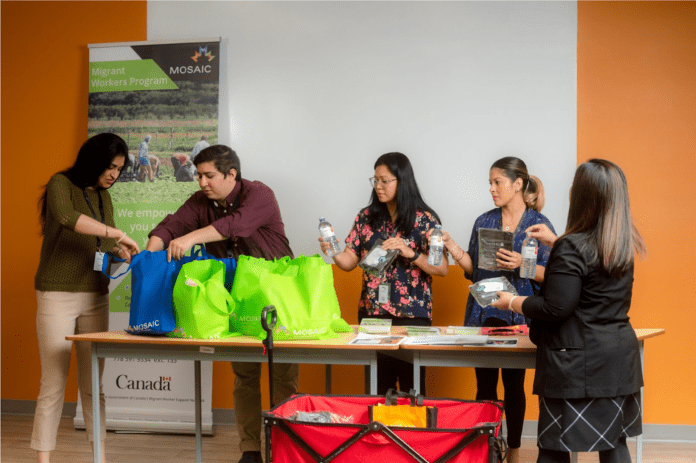
Suneet Gill, Local Journalism Initiative Reporter, New Canadian Media
Canada’s new policy that allows temporary foreign workers to pursue education or training without separate study permits is a welcome change, says Metro Vancouver’s largest nonprofit dedicated to helping immigrants.
“I think for someone that is already established, it’s a very good avenue to have more flexibility and be better prepared to have more credentials to act in different jobs,” said Hugo Velazquez, the senior manager of community engagement, advocacy and migrant worker programs at MOSAIC.
Federal Immigration Minister Sean Fraser announced the policy on June 27. It removes the six-month limit on education programs that temporary foreign workers can enrol in without needing a separate study permit. The policy is a three-year measure to fill labour market gaps.
“With this policy in place, we hope to empower foreign nationals to improve their skills in order to meet their career goals and achieve their dreams, while providing a future potential source of talent for our labour market,” Fraser said in a press release.
Velazquez agrees the measure will help create specialized workers and address labour shortages, but he finds tuition costs — on top of paying for housing and groceries — remain a barrier for migrant workers to study.
“For those who come in and have that liberty (to pay), well it will be very easy, but probably there will have to be also the support to subsidize part of those tuitions to make it easier for them to access. Some programs do, but not all of them. It depends on what they’re studying.”
Juan Trevino, a settlement worker for MOSAIC’s migrant workers program, has already received a handful of inquiries on the new education policy since it was announced.
He anticipates the policy change will create some excitement, but also more frustration among those who cannot afford to enrol in study programs.
Trevino said he finds most of the migrant workers he serves — who work mainly in agriculture, caregiving and hospitality — won’t be able to take advantage of the measure.
“Farm workers are probably in the most … exploitative industry that there is, so they definitely cannot benefit from this because most of them, when they’re in the peak of the season, they’re working 12, sometimes 14-hour shifts,” he said.
“Even if they have the means to do it, they’re in remote areas. They don’t have the accessibility to take these courses even if they were online, and they certainly don’t have the money.”
But Trevino said he believes the spouses of foreign workers, who may be granted an open work permit, could use the policy to enrol in study programs.
“If your partner is given an open work permit, I think that puts pressure on finding suitable employment, because you’re given the opportunity to work wherever you want on paper,” he said.
“But in reality, it’s really challenging to find a position that goes with what you were doing back in your own country. So I think the possibility of this policy change could be that some spouses can perhaps take certificates or short diplomas.”
B.C. university welcomes the new measure
Kwantlen Polytechnic University (KPU), which offers practical, hands-on study programs at its Surrey, Richmond and Langley campuses, is embracing the change as a step towards Canada attracting skilled foreign workers and providing them with opportunities to further their education.
Carole St. Laurent, associate vice-president of KPU International, said the university welcomes foreign workers to enrol.
“I don’t think we’ve experienced in the past any foreign workers that have wanted to subsequently come to KPU as a student, so this has definitely opened up those doors to those students who normally would not have had that opportunity to come study if they were here on a work permit,” St. Laurent said.
She said the measure will make the admissions process more efficient for foreign workers; in the past, there have been lengthy delays in approving study permit applications.
Foreign workers who are enrolled at KPU are recognized as international students so they will have access to the same support services as those students, St. Laurent said. This includes a peer mentor, and an academic and immigration advisor, who will help them with program guidance, career counselling and mental health services.
While foreign workers will have to pay international student fees, they are still eligible to apply for scholarships and bursaries. In terms of accessibility, St. Laurent says KPU is flexible.
“They can pick and choose the courses they want to attend depending on their hours of work,” she said. “There are classes available in the evening, some on weekends, so they can register for courses that will fit within their work schedule.”
KPU International has developed a series of FAQs that are posted on its website, which include answers to questions on the post-graduation work permit (PGWP) and admissions.
The FAQs note that foreign workers wanting to study at KPU solely on an open work permit cannot receive a PGWP. And if a program is longer than the length of a prospective student’s work permit, KPU requires a study permit.
The university will accept foreign workers with work permits issued on or before June 7, or those who applied to renew their work permit by the same date. Foreign workers will not face restrictions on programs they can enrol in, but some have additional requirements and limited seating, according to the FAQs.
Immigration, Refugees and Citizenship Canada said the new policy will be evaluated for success and to be improved.

